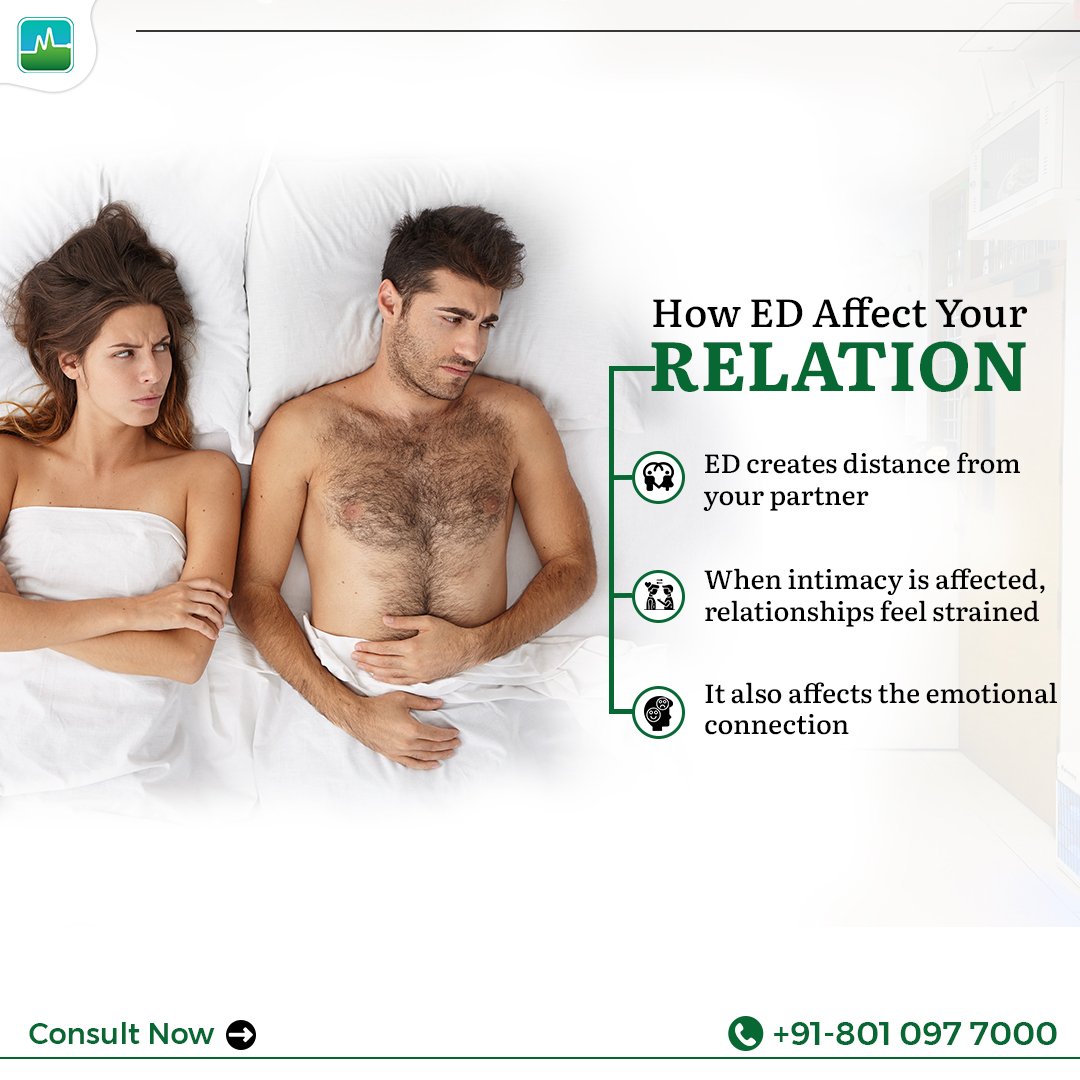Erectile dysfunction is the inability to get or keep an erection firm enough for sexual intercourse. While occasional difficulty achieving an erection is normal, ongoing ED can be a sign of an underlying health issue that requires attention.
It’s important to note that ED can vary in severity. For some, it might happen occasionally, while for others, it could be a frequent problem. ED is not limited to older men—many younger men can experience it as well, and it can affect their self-esteem, relationships, and overall quality of life.
Common Causes of Erectile Dysfunction
ED can stem from a variety of physical, psychological, and lifestyle factors. It’s often a combination of causes that contribute to the condition.
1- Physical Causes
- Cardiovascular Issues: Poor blood flow due to heart disease, high cholesterol, or high blood pressure can prevent the penis from receiving enough blood to achieve an erection.
- Diabetes: High blood sugar levels can damage nerves and blood vessels, leading to ED.
- Hormonal Imbalances: Low testosterone or other hormonal disruptions can play a role in ED.
- Neurological Conditions: Conditions like Parkinson’s disease, multiple sclerosis, and spinal cord injuries can affect nerve function and lead to ED.
- Medications: Some medications, such as those used for depression, high blood pressure, or anxiety, can cause ED as a side effect.
2- Psychological Causes
- Stress and Anxiety: Work, financial stress, or relationship issues can cause mental blocks, leading to performance anxiety and ED.
- Depression: Depression and other mood disorders can lower sexual desire and interfere with erectile function.
- Relationship Issues: Communication problems, unresolved conflicts, or lack of intimacy can affect both partners’ sexual health.
3- Lifestyle Factors
- Excessive Alcohol Consumption: Drinking too much can affect sexual performance by impairing nerve function and blood flow.
- Smoking: Smoking can damage blood vessels, reducing blood flow to the penis and increasing the risk of ED.
- Obesity: Being overweight can increase the risk of developing diabetes, heart disease, and other health problems that contribute to ED.
Treatment Options for Erectile Dysfunction
The good news is that ED is treatable, and there are a variety of solutions available depending on the underlying causes. It’s crucial to consult a healthcare provider to determine the best treatment plan for your partner.
1- – Lifestyle Changes
- Exercise: Regular physical activity improves blood flow, reduces stress, and can help with weight management, which all contribute to improving erectile function.
- Healthy Diet: A balanced diet rich in fruits, vegetables, whole grains, and lean proteins can support overall health and improve circulation.
- Limiting Alcohol and Smoking: Cutting down on alcohol and quitting smoking can significantly improve sexual function.
2- Medications
- Oral Medications: Drugs like sildenafil (Viagra), tadalafil (Cialis), and vardenafil (Levitra) work by improving blood flow to the penis. These are often prescribed when ED is due to blood flow issues.
- Hormonal Treatments: If low testosterone is the cause, hormone replacement therapy may be recommended.
- Injection Therapy: In some cases, injections directly into the penis can help achieve an erection.
3- Therapy
- Psychological Counseling: If stress, anxiety, or depression is contributing to ED, therapy (such as cognitive-behavioral therapy) can be highly beneficial.
- Couples Therapy: Sometimes, ED is a symptom of relationship issues. Working with a counselor to improve communication and intimacy can help both partners.
How to Support Your Partner with ED
If your partner is suffering from ED, your role as a supportive partner is incredibly important. The emotional toll of ED can affect their self-esteem and confidence, so being understanding and patient is crucial. Here are some ways you can offer your support:
- Communicate Openly and Without Judgment
Talk about the issue without shame or blame. Encourage your partner to share their feelings and concerns. Let them know that ED doesn’t diminish your attraction to them and that you are in this together.
- Be Patient
ED can be frustrating, but remember that your partner isn’t “choosing” to have difficulty. It’s not a reflection of their desire for you, but rather a medical or emotional issue that needs to be addressed.
- Encourage Professional Help
Encourage your partner to speak to a healthcare professional. Seeking medical advice is a sign of strength, and treatment options are available.
- Focus on Intimacy, Not Just Sex
ED isn’t just about sexual performance; it’s about intimacy. Explore other ways of connecting physically and emotionally, such as cuddling, kissing, or engaging in activities that increase closeness and affection without focusing solely on intercourse.
- Create a Positive, Low-Pressure Environment
Avoid making the situation feel like a “problem” that needs to be fixed immediately. Instead, let your partner know that it’s okay to take things at a pace that feels comfortable for both of you.
Conclusion
Erectile dysfunction is a common and treatable condition that affects many men, but it doesn’t have to define your relationship or intimacy. Understanding the causes, treatment options, and how to support your partner through this challenge is key to managing ED as a couple. With open communication, patience, and the right treatment, many men with ED can regain their confidence and enjoy a fulfilling, healthy sex life.
If you or your partner are struggling with ED, remember that you’re not alone, and seeking help is the first step toward finding a solution that works for you both.











Leave a Reply